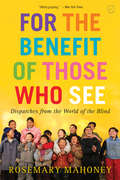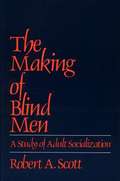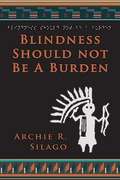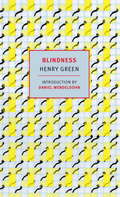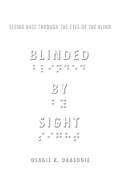Special Collections
Blindness and Visual Impairment Special Collection
Description: A collection featuring biographies, memoirs, fiction and non-fiction by and about members of the blind community. #disability
- Table View
- List View
For the Benefit of Those Who See
by Rosemary Mahoney"In this intelligent and humane book, Rosemary Mahoney writes of people who are blind....She reports on their courage and gives voice, time and again, to their miraculous dignity."--Andrew Solomon, author of Far From the Tree
In the tradition of Oliver Sacks's The Island of the Colorblind, Rosemary Mahoney tells the story of Braille Without Borders, the first school for the blind in Tibet, and of Sabriye Tenberken, the remarkable blind woman who founded the school. Fascinated and impressed by what she learned from the blind children of Tibet, Mahoney was moved to investigate further the cultural history of blindness.
As part of her research, she spent three months teaching at Tenberken's international training center for blind adults in Kerala, India, an experience that reveals both the shocking oppression endured by the world's blind, as well as their great resilience, integrity, ingenuity, and strength.
By living among the blind, Rosemary Mahoney enables us to see them in fascinating close up, revealing their particular "quality of ease that seems to broadcast a fundamental connection to the world." Having read FOR THE BENEFIT OF THOSE WHO SEE, you will never see the world in quite the same way again.
The Making Of Blind Men
by Robert A. ScottThe disability of blindness is a learned social role. The various attitudes and patterns of behavior that characterize people who are blind are not inherent in their condition but, rather, are acquired through ordinary processes of social learning. The Making of Blind Men is intended as a systematic and integrated overview of the blindness problem in America.
Dr. Scott chronicles which aspects of this problem are being dealt with by organizations for the blind and the effectiveness of this intervention system. He details the potential consequences of blind people becoming clients of blindness agencies by pointing out that many of the attitudes, behavior patterns, and qualities of character that have been assumed to be given to blind people by their condition are, in fact, products of socialization. As the self-concepts of blind men are generated by the same processes of socialization that shape us all,
Dr. Scott puts forth the challenge of reforming the organized intervention system by critically evaluating the validity of blindness workers' assumptions about blindness and the blind. It is felt that an enlightened work force can then render the socialization process of the blind into a rational and deliberate force for positive change.
Blindness Should Not Be a Burden
by Archie R. SilagoArchie Silago is a member of the Navajo Nation. Archie was born in 1951 at Crownpoint, New Mexico. At 17, a detached retina left him blind in his right eye; five years later he suffered the same fate in his left eye and became completely blind.
Eventually, he decided to attend college. He received his Bachelor s Degree in Psychology from New Mexico State University, completed a Master s Degree in Counseling at Western New Mexico University and became a Licensed Mental Health Counselor (LMHC). Today he is pursuing his PhD in Psychology. This memoir is intended to inspire and motivate other individuals with disabilities to help themselves to move forward with life.
Blindness
by Henry Green and Daniel MendelsohnHenry Green's first novel, and the book that began his career as a master of British modernism.
Blindness—Henry Green’s first novel, begun while he was still at Eton and finished before he left university—is the story of John Haye, a young student with literary airs. It starts with an excerpt from his diary, brimming with excitement and affectation and curiosity about life and literature.
Then a freak accident robs John of his sight, plunging him into despair. Forced to live with his high-handed, horsey stepmother in the country, John begins a weird dalliance with a girl named Joan, leading to a new determination.
Blindness is the curse of youth and inexperience and love and ambition, but blindness, John will discover, can also be the source of vision.
Blinded by Sight
by Osagie K. ObasogieColorblindness has become an integral part of the national conversation on race in America. Given the assumptions behind this influential metaphor—that being blind to race will lead to racial equality—it's curious that, until now, we have not considered if or how the blind "see" race. Most sighted people assume that the answer is obvious: they don't, and are therefore incapable of racial bias—an example that the sighted community should presumably follow.
In Blinded by Sight,Osagie K. Obasogie shares a startling observation made during discussions with people from all walks of life who have been blind since birth: even the blind aren't colorblind—blind people understand race visually, just like everyone else. Ask a blind person what race is, and they will more than likely refer to visual cues such as skin color. Obasogie finds that, because blind people think about race visually, they orient their lives around these understandings in terms of who they are friends with, who they date, and much more.
In Blinded by Sight, Obasogie argues that rather than being visually obvious, both blind and sighted people are socialized to see race in particular ways, even to a point where blind people "see" race. So what does this mean for how we live and the laws that govern our society? Obasogie delves into these questions and uncovers how color blindness in law, public policy, and culture will not lead us to any imagined racial utopia.
